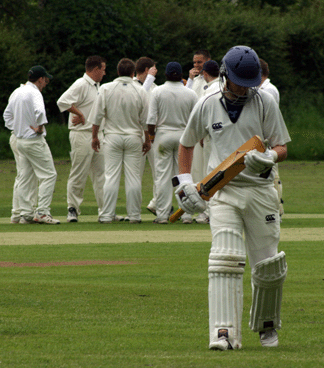News
A Word About Cricket
Mel’s Note: This is in response to some of the cricket comments and questions on Sid’s previous letter. He once tried to explain cricket to me, while we were watching a game on the telly and with plenty of props. I’m still lost.
It’s quite hard to find any overt cricket fanatics – there’s Harold Pinter and…
The main attraction of the game is that it is very easy to play and incredibly difficult to follow which creates a kind of mystique.
There are two teams of 11 players. At the beginning of the day’s game the two captains from each side toss a coin to decide who does what, batting or fielding. So far it’s a bit like baseball.
Who came up with the dress situation for baseball players, by the way? Is there an actual person? I know that it has become normal to see grown men wearing capri pants but surely someone is to blame.
Cricketers, of course, wear immaculate all white slacks, a decent flannel shirt and possibly a sleeveless jersey if there’s a nip in the air. The fielders warm up before taking their positions on the field. We might throw the ball at each other or attempt to touch our toes. The ham-strings dictate the length of the warm up.
The batsmen take up their positions. There are two batsmen instead of one because it is a long way out to the centre of the field and it’s wise to take a spare in case one of them is out very early. Cricket is a numerologicaly interesting game because it revolves around the number 6. (I haven’t looked that number up but it’s probably one of the ‘power’ numbers.)
Every six pitches or throws or balls as we (rather unfortunately in todays idiom) like to call them, the whole game resets and faces the opposite way and starts again. Another six deliveries, reset etc. These resets are called ‘overs’.
The aim is the same as it is in baseball, to stop the batter from scoring runs, but we don’t run to 3 different places before getting back home, we only run to one place, the other wicket.There are only two ‘bases’ in cricket and they are called wickets (probably because that rhymes with cricket).
The methods of getting a batsman out are very similar to baseball, you can be caught or run out, but you only get one ‘strike’: if the bowler delivers a ball and it hits the wicket behind you (3 upright sticks in the ground) you can simply start wandering back to the pavilion for a hard earned cup of tea and reassuring nothings from the other batsmen waiting to go and play because you are ‘out’.
A batsman can be out in several other ways but the only important one is called “Leg Before Wicket” or just LBW. This law ensures that a batsman will not hunker down in front of his wicket and watch all the balls simply deflect off his body – if the ball is adjudged to have been prevented from hitting the wicket by striking any part of the batsman’s anatomy from the elbow down, the Umpire will call him out, silently and menacingly, by raising a single finger in the air. Politeness dictates which finger is eventually raised.
If at any time that there is an ambiguous decision about LBW or a catch that has only faintly knicked the edge of the bat, the whole fielding team are required to shout “How was that?” at the top of their lungs – this roughly translates to “WAAAAA-AAAA!” to anyone lucky enough to be witness to such a thrilling event.
As soon as the fielding side has dismissed all but one of the batsmen (there must always be two in the middle), the innings is over, whereupon everyone ambles off the field to sit around a table laden with sandwiches and cakes and strong cups of tea. This, unsurprisingly, is called the ‘tea interval’ and it is arguably the most important aspect of the game for obvious reasons.
Thus fortified (and slightly susceptible to violent cramping, depending on the quality of the tea), the teams swap roles and the game continues. The new batsmen attempt to beat whatever score was achieved by the pre-tea batting side.
A normal village game will last about 6 hours. You can pick alot of daisies in 6 hours.
George Bernard Shaw famously preferred baseball to cricket because baseball was over sooner.











21 Comments